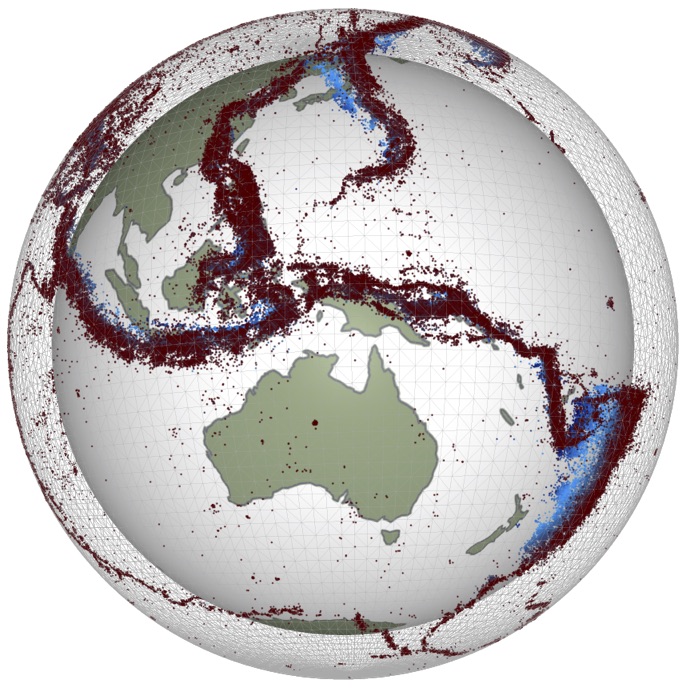Using the PETSc mesh integration routines#
This is probably better moved to become a test !
import underworld3 as uw
import numpy as np
import sympy
mesh = uw.meshing.UnstructuredSimplexBox(minCoords=(0.0, 0.0), maxCoords=(1.0, 1.0), cellSize=1.0 / 32.0, regular=True)
s_soln = uw.discretisation.MeshVariable("T", mesh, 1, degree=2) # add this line to avoid petsc error for time being
x = mesh.N.x
y = mesh.N.y
z = mesh.N.z
I = uw.maths.Integral(mesh, x * y)
print(I.evaluate()) # 0.25
mesh = uw.meshing.StructuredQuadBox(minCoords=(0.0, 0.0), maxCoords=(1.0, 1.0), elementRes=(32, 32))
s_soln = uw.discretisation.MeshVariable("T", mesh, 1, degree=2) # add this line to avoid petsc error for time being
x = mesh.N.x
y = mesh.N.y
z = mesh.N.z
I2 = uw.maths.Integral(mesh, x * y)
print(I2.evaluate()) # 0.25
mesh = uw.meshing.StructuredQuadBox(minCoords=(0.0, 0.0, 0.0), maxCoords=(1.0, 1.0, 1.0), elementRes=(8, 8, 8))
s_soln = uw.discretisation.MeshVariable("T", mesh, 1, degree=2) # add this line to avoid petsc error for time being
x = mesh.N.x
y = mesh.N.y
z = mesh.N.z
I3 = uw.maths.Integral(mesh, x * y * z)
print(I3.evaluate()) # 0.125
mesh = uw.meshing.UnstructuredSimplexBox(
minCoords=(0.0, 0.0, 0.0), maxCoords=(1.0, 1.0, 1.0), cellSize=1.0 / 8.0, regular=True
)
s_soln = uw.discretisation.MeshVariable("T", mesh, 1, degree=2) # add this line to avoid petsc error for time being
x = mesh.N.x
y = mesh.N.y
z = mesh.N.z
I4 = uw.maths.Integral(mesh, x * y * z)
print(I4.evaluate()) # 0.125
mesh = uw.meshing.Annulus(radiusInner=0.5, radiusOuter=1.0, cellSize=0.05)
s_soln = uw.discretisation.MeshVariable("T", mesh, 1, degree=2) # add this line to avoid petsc error for time being
x = mesh.N.x
y = mesh.N.y
z = mesh.N.z
I5 = uw.maths.Integral(mesh, 1.0)
print(I5.evaluate()) # 3 * pi / 4 = 2.35
mesh = uw.meshing.Annulus(radiusInner=0.0, radiusOuter=1.0, cellSize=0.05)
s_soln = uw.discretisation.MeshVariable("T", mesh, 1, degree=2) # add this line to avoid petsc error for time being
x = mesh.N.x
y = mesh.N.y
z = mesh.N.z
I6 = uw.maths.Integral(mesh, 1.0)
print(I6.evaluate()) # pi
mesh = uw.meshing.SphericalShell(radiusInner=0.5, radiusOuter=1.0, cellSize=0.2)
s_soln = uw.discretisation.MeshVariable("T", mesh, 1, degree=2) # add this line to avoid petsc error for time being
x = mesh.N.x
y = mesh.N.y
z = mesh.N.z
I7 = uw.maths.Integral(mesh, 1)
print(I7.evaluate()) # 4/3 * 7/8 * pi
mesh = uw.meshing.SphericalShell(radiusInner=0.0, radiusOuter=1.0, cellSize=0.2)
s_soln = uw.discretisation.MeshVariable("T", mesh, 1, degree=2) # add this line to avoid petsc error for time being
x = mesh.N.x
y = mesh.N.y
z = mesh.N.z
I8 = uw.maths.Integral(mesh, 1)
print(I8.evaluate()) # 4/3 * pi
# mesh = uw.meshing.CubicSphere(radiusInner=0.5, radiusOuter=1.0, numElements=30)
# s_soln = uw.discretisation.MeshVariable("T", mesh, 1, degree=2) # add this line to avoid petsc error for time being
# x = mesh.N.x
# y = mesh.N.y
# z = mesh.N.z
# I9 = uw.maths.Integral(mesh, 1)
# print(I9.evaluate()) # 4/3 * 7/8 * pi (3.634)
mesh = uw.meshing.SphericalShell(radiusInner=0.0, radiusOuter=1.0, cellSize=0.5)
# mesh = uw.meshing.Annulus(radiusInner = 0.0, radiusOuter=1.0, cellSize=0.05)
s_soln = uw.discretisation.MeshVariable("T", mesh, 1, degree=2) # add this line to avoid petsc error for time being
x = mesh.N.x
y = mesh.N.y
z = mesh.N.z
radius_fn = sympy.sqrt(mesh.rvec.dot(mesh.rvec)) # normalise by outer radius if not 1.0
unit_rvec = mesh.rvec / (1.0e-10 + radius_fn)
r = sympy.sqrt(x**2 + y**2)
th = sympy.atan2(y + 1.0e-10, x + 1.0e-10)
v_soln = uw.discretisation.MeshVariable("U", mesh, mesh.dim, degree=2)
p_soln = uw.discretisation.MeshVariable("P", mesh, 1, degree=1)
t_soln = uw.discretisation.MeshVariable("T", mesh, 1, degree=3)
swarm = uw.swarm.Swarm(mesh=mesh)
v_star = uw.swarm.SwarmVariable("Vs", swarm, mesh.dim, proxy_degree=2)
remeshed = uw.swarm.SwarmVariable("Vw", swarm, 1, dtype="int", _proxy=False)
X_0 = uw.swarm.SwarmVariable("X0", swarm, mesh.dim, _proxy=False)
swarm.populate(fill_param=4)
I10 = uw.maths.Integral(mesh, 1)
print(I10.evaluate())
stokes = uw.systems.Stokes(
mesh,
velocityField=v_soln,
pressureField=p_soln,
# u_degree=v_soln.degree,
# p_degree=p_soln.degree,
verbose=False,
solver_name="stokes",
)
stokes.constitutive_model = uw.constitutive_models.ViscousFlowModel
stokes.add_dirichlet_bc((0.0, 0.0, 0.0), "Upper", (0, 1, 2))
stokes.viscosity = 1.0
stokes.bodyforce = mesh.rvec * sympy.sin(th)
stokes.solve()
I10 = uw.maths.Integral(mesh, v_soln.fn.dot(v_soln.fn))
print(I10.evaluate())
## Check this this sort of thing works OK
mesh = uw.meshing.SphericalShell(radiusInner=0.0, radiusOuter=1.0, cellSize=0.1)
x = mesh.N.x
y = mesh.N.y
z = mesh.N.z
meshvar = uw.discretisation.MeshVariable("phi", mesh, 1, degree=3)
I = uw.maths.Integral(mesh, 1)
print(I.evaluate()) # 4/3 * pi
I.fn = 0.75
print(I.evaluate()) # pi
I.fn = x
print(I.evaluate()) # should be zero
I.fn = x + y + z
print(I.evaluate()) # should be zero
with mesh.access(meshvar):
meshvar.data[:, 0] = uw.function.evaluate(x + y + z, meshvar.coords)
I.fn = meshvar.fn
print(I.evaluate()) # should be zero

